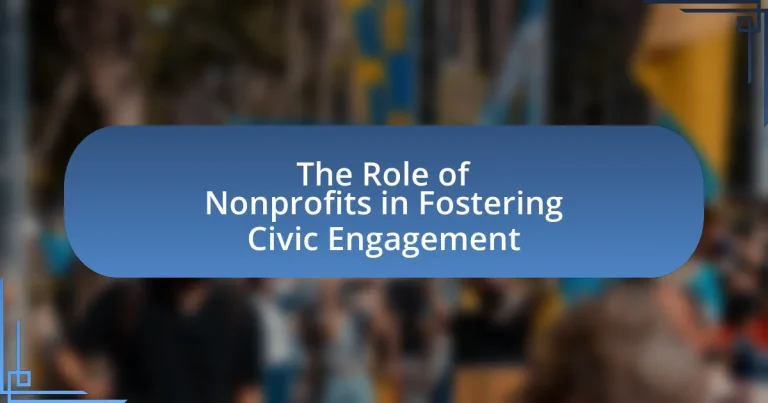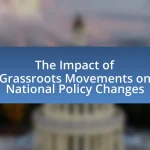Nonprofits play a vital role in fostering civic engagement by mobilizing communities, providing resources for participation, and advocating for social change. They implement programs such as voter registration drives, community organizing initiatives, and public policy advocacy campaigns, which enhance civic participation and empower individuals. The article explores how nonprofits contribute to community involvement, the challenges they face, and the strategies they employ to engage diverse populations. It also highlights the importance of civic engagement for local governance and community resilience, as well as the impact of technology and partnerships in enhancing these efforts.
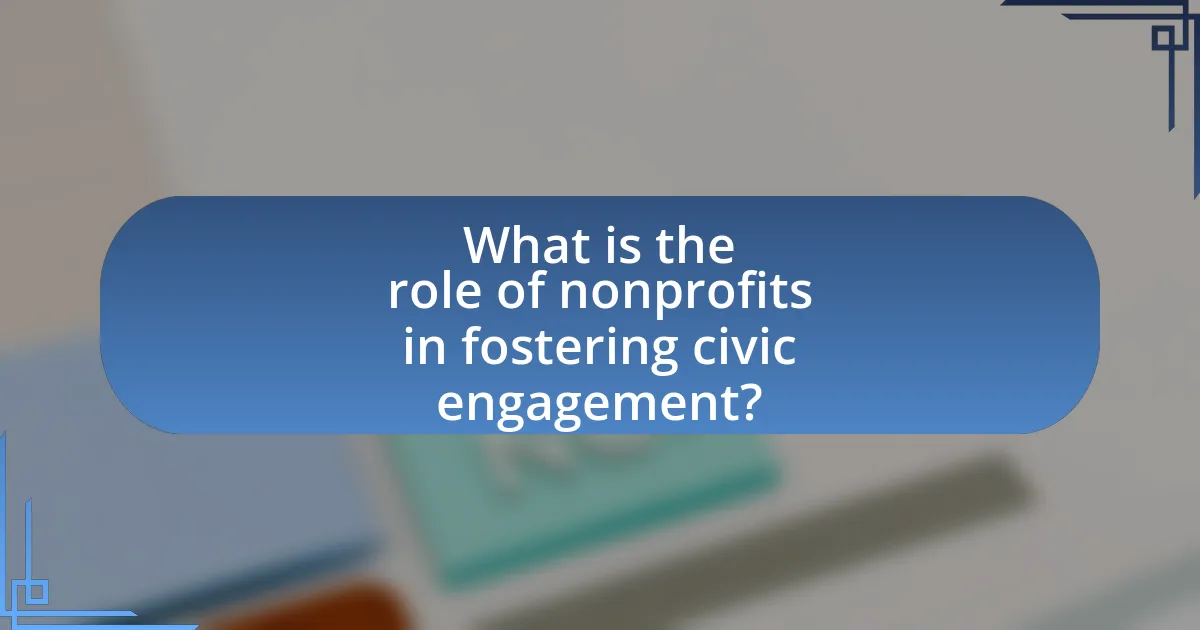
What is the role of nonprofits in fostering civic engagement?
Nonprofits play a crucial role in fostering civic engagement by mobilizing communities, providing resources for participation, and advocating for social change. They facilitate voter registration drives, organize community forums, and offer educational programs that empower individuals to engage in democratic processes. For instance, organizations like the League of Women Voters have historically increased voter turnout by providing nonpartisan information about the electoral process. Additionally, nonprofits often serve as a bridge between marginalized communities and government entities, ensuring that diverse voices are heard in policy discussions. This engagement is supported by research indicating that communities with active nonprofit organizations tend to have higher levels of civic participation and social capital.
How do nonprofits contribute to community involvement?
Nonprofits contribute to community involvement by mobilizing volunteers, providing resources, and fostering collaboration among community members. They engage individuals in various activities such as fundraising, advocacy, and service projects, which enhances civic participation. For instance, according to the National Council of Nonprofits, nonprofits engage over 63 million volunteers annually in the United States, demonstrating their significant role in promoting active citizenship and community engagement. This involvement not only addresses local needs but also strengthens social networks and encourages a sense of belonging among residents.
What specific programs do nonprofits implement to encourage civic participation?
Nonprofits implement various specific programs to encourage civic participation, including voter registration drives, community organizing initiatives, and public policy advocacy campaigns. Voter registration drives aim to increase electoral participation by helping individuals register to vote, often targeting underrepresented communities. Community organizing initiatives mobilize residents around local issues, fostering grassroots involvement and collective action. Public policy advocacy campaigns educate citizens on legislative matters and encourage them to engage with policymakers, thereby influencing decision-making processes. These programs are supported by research indicating that active civic engagement leads to stronger communities and more responsive governance.
How do nonprofits mobilize volunteers for civic activities?
Nonprofits mobilize volunteers for civic activities by implementing targeted outreach strategies, leveraging community networks, and providing training and support. These organizations often utilize social media campaigns, community events, and partnerships with local businesses to attract volunteers. For instance, a study by the Corporation for National and Community Service found that organizations that actively engage in community outreach and utilize digital platforms can increase volunteer participation by up to 50%. Additionally, nonprofits often create a structured volunteer program that includes orientation and ongoing training, which enhances volunteer retention and effectiveness in civic activities.
Why is civic engagement important for communities?
Civic engagement is important for communities because it fosters social cohesion and empowers individuals to influence local decision-making. Engaged citizens are more likely to participate in community activities, advocate for their needs, and collaborate on solutions to local issues. Research indicates that communities with higher levels of civic engagement experience improved public services and enhanced quality of life, as seen in studies by the National Civic League, which highlight the correlation between active participation and community resilience.
What are the social benefits of increased civic engagement?
Increased civic engagement leads to stronger communities and enhanced social cohesion. When individuals participate in civic activities, such as volunteering or attending town hall meetings, they foster relationships and trust among community members. Research indicates that communities with higher levels of civic engagement experience lower crime rates and improved public health outcomes, as seen in studies conducted by the National Civic League, which found that engaged citizens are more likely to collaborate on local issues, leading to effective problem-solving. Additionally, civic engagement promotes inclusivity and representation, ensuring diverse voices are heard in decision-making processes, which strengthens democracy and social equity.
How does civic engagement impact local governance?
Civic engagement significantly enhances local governance by fostering greater accountability and responsiveness among elected officials. When citizens actively participate in decision-making processes, such as town hall meetings or community forums, they provide valuable feedback that can shape policies and initiatives. Research indicates that communities with higher levels of civic engagement experience improved public services and increased trust in government, as evidenced by a study from the National Civic League, which found that engaged citizens are more likely to report satisfaction with local governance. This active participation leads to more informed and representative decision-making, ultimately benefiting the community as a whole.
What challenges do nonprofits face in fostering civic engagement?
Nonprofits face several challenges in fostering civic engagement, including limited funding, lack of resources, and difficulties in reaching diverse populations. Limited funding restricts nonprofits’ ability to implement effective programs and outreach initiatives, which is critical for engaging communities. According to a 2020 report by the National Council of Nonprofits, 70% of nonprofits reported that financial constraints hindered their capacity to engage citizens effectively. Additionally, a lack of resources, such as staff and technology, further complicates their efforts to mobilize community participation. Furthermore, reaching diverse populations can be challenging due to language barriers, cultural differences, and varying levels of trust in institutions, which can impede effective communication and engagement strategies.
How do funding limitations affect nonprofit initiatives?
Funding limitations significantly hinder nonprofit initiatives by restricting their operational capacity and program development. Nonprofits often rely on grants, donations, and fundraising efforts to finance their activities; when these funding sources are limited, they face challenges in maintaining staff, delivering services, and expanding outreach. For instance, a study by the Urban Institute found that 70% of nonprofits reported funding constraints as a primary barrier to achieving their missions, leading to reduced program effectiveness and community impact. Consequently, limited funding can result in decreased civic engagement opportunities, as nonprofits struggle to mobilize resources for community involvement and advocacy efforts.
What barriers exist for community members in participating in civic activities?
Barriers for community members in participating in civic activities include lack of access to information, financial constraints, and social or cultural obstacles. Many individuals are unaware of civic opportunities due to insufficient outreach or communication from organizations, which limits their engagement. Financial constraints, such as transportation costs or the need to prioritize work over civic involvement, further hinder participation. Additionally, social or cultural factors, including language barriers or a lack of representation, can discourage individuals from engaging in civic activities. Research indicates that these barriers significantly impact civic engagement levels, as evidenced by studies showing that communities with robust outreach programs see higher participation rates.
How do nonprofits collaborate with other organizations to enhance civic engagement?
Nonprofits collaborate with other organizations to enhance civic engagement by forming partnerships that leverage resources, expertise, and networks. These collaborations often involve joint initiatives, such as community outreach programs, advocacy campaigns, and educational workshops, which aim to mobilize citizens and increase participation in civic activities. For instance, the National Council of Nonprofits highlights that partnerships between nonprofits and local governments can lead to more effective voter registration drives, thereby increasing electoral participation. Additionally, research from the Stanford Social Innovation Review indicates that cross-sector collaborations can amplify the impact of civic engagement efforts by combining the strengths of various organizations, such as nonprofits, businesses, and educational institutions, to address community needs more comprehensively.
What strategies can nonprofits use to effectively engage diverse populations?
Nonprofits can effectively engage diverse populations by implementing culturally relevant outreach strategies. These strategies include conducting community needs assessments to understand the specific interests and challenges of different demographic groups, which allows nonprofits to tailor their programs and services accordingly. For instance, a study by the Nonprofit Research Collaborative found that organizations that actively involve community members in program design see higher participation rates among diverse populations. Additionally, utilizing multilingual communication and hiring staff from the communities served can enhance trust and accessibility, further promoting engagement.
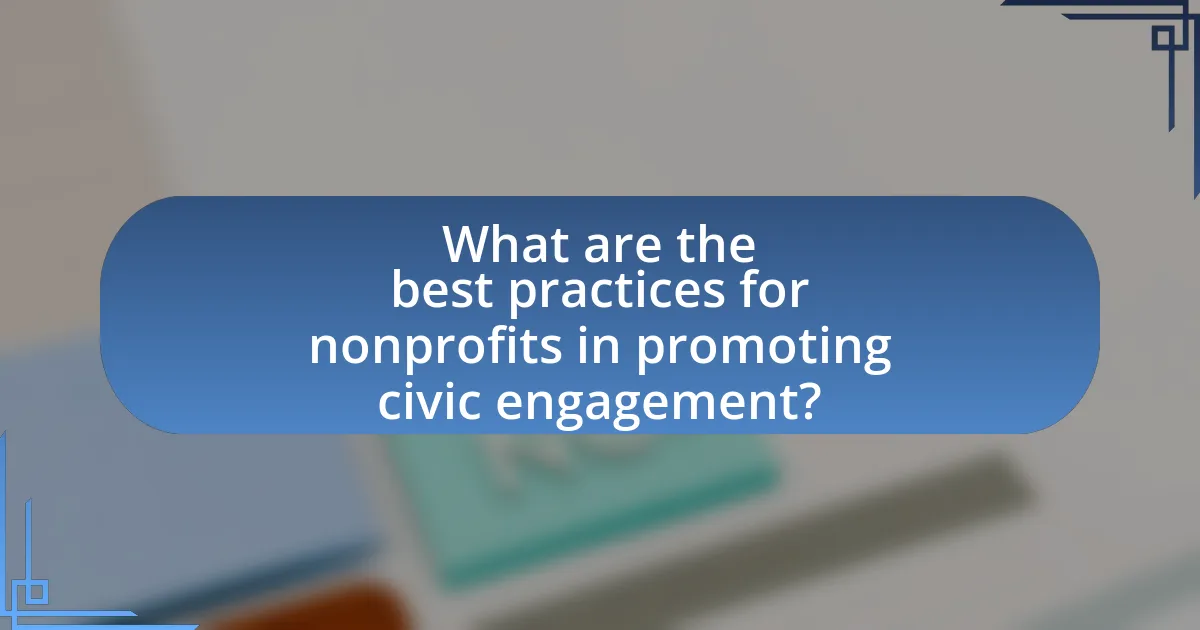
What are the best practices for nonprofits in promoting civic engagement?
Nonprofits can effectively promote civic engagement by implementing strategies such as community outreach, education, and collaboration with local organizations. Community outreach involves actively engaging with residents to understand their needs and encourage participation in civic activities, which has been shown to increase voter turnout by 5-10% in various studies. Education initiatives, such as workshops and informational sessions, empower individuals with knowledge about civic rights and responsibilities, leading to more informed citizens. Collaboration with local organizations enhances resource sharing and amplifies outreach efforts, as evidenced by partnerships that have successfully mobilized communities for civic events. These best practices create a more engaged citizenry and foster a culture of participation in democratic processes.
How can nonprofits measure the impact of their civic engagement efforts?
Nonprofits can measure the impact of their civic engagement efforts through a combination of quantitative and qualitative metrics. Quantitative metrics include tracking participation rates in events, surveys assessing community awareness before and after initiatives, and analyzing changes in voter turnout or civic participation statistics. For example, a study by the National Council of Nonprofits found that organizations that implemented structured civic engagement programs saw a 20% increase in community participation over a year. Qualitative metrics involve gathering testimonials, conducting interviews with participants, and assessing community feedback to understand the perceived value and effectiveness of the engagement efforts. This dual approach allows nonprofits to comprehensively evaluate their impact and adjust strategies accordingly.
What metrics are most effective for evaluating civic engagement initiatives?
The most effective metrics for evaluating civic engagement initiatives include participation rates, demographic diversity of participants, and the impact on community outcomes. Participation rates measure the number of individuals involved in initiatives, providing a clear indicator of engagement levels. Demographic diversity assesses whether the initiative reaches various community segments, ensuring inclusivity. The impact on community outcomes evaluates changes in civic knowledge, voter turnout, or community cohesion, demonstrating the initiative’s effectiveness. Research by the National Civic League highlights that these metrics are crucial for understanding the success and areas for improvement in civic engagement efforts.
How can feedback from the community improve nonprofit programs?
Feedback from the community can significantly improve nonprofit programs by providing insights into the needs and preferences of the target population. This direct input allows nonprofits to tailor their services more effectively, ensuring that programs address the actual challenges faced by community members. For instance, a study by the Stanford Social Innovation Review found that organizations that actively solicit and incorporate community feedback see a 30% increase in program effectiveness. By engaging with the community, nonprofits can also foster a sense of ownership and trust, leading to higher participation rates and better outcomes.
What role does technology play in enhancing civic engagement through nonprofits?
Technology significantly enhances civic engagement through nonprofits by facilitating communication, increasing accessibility, and enabling data-driven decision-making. Nonprofits utilize social media platforms to reach broader audiences, mobilize volunteers, and raise awareness about social issues, which can lead to increased participation in civic activities. For instance, a report by the Pew Research Center indicates that 69% of adults in the U.S. use social media, making it a powerful tool for nonprofits to engage citizens effectively. Additionally, technology provides online platforms for petitions, fundraising, and community organizing, allowing nonprofits to gather support and resources more efficiently. The use of data analytics helps nonprofits understand community needs better and tailor their programs accordingly, thereby fostering a more engaged citizenry.
How can social media be utilized to promote civic activities?
Social media can be utilized to promote civic activities by serving as a platform for awareness, engagement, and mobilization. Nonprofits can leverage social media to disseminate information about civic events, such as community meetings or volunteer opportunities, reaching a broader audience quickly. For instance, a study by the Pew Research Center found that 69% of adults in the U.S. use social media, making it an effective tool for nonprofits to engage citizens in civic discussions and activities. Additionally, social media allows for real-time interaction, enabling organizations to gather feedback and foster community dialogue, which enhances civic participation.
What online tools can nonprofits use to facilitate community engagement?
Nonprofits can use online tools such as social media platforms, community forums, and email marketing services to facilitate community engagement. Social media platforms like Facebook and Twitter allow nonprofits to share updates, gather feedback, and foster discussions among community members. Community forums, such as Nextdoor or dedicated nonprofit platforms, enable localized conversations and connections. Email marketing services like Mailchimp help nonprofits communicate directly with their supporters, providing updates and calls to action. These tools enhance visibility, encourage participation, and strengthen community ties, which are essential for effective civic engagement.
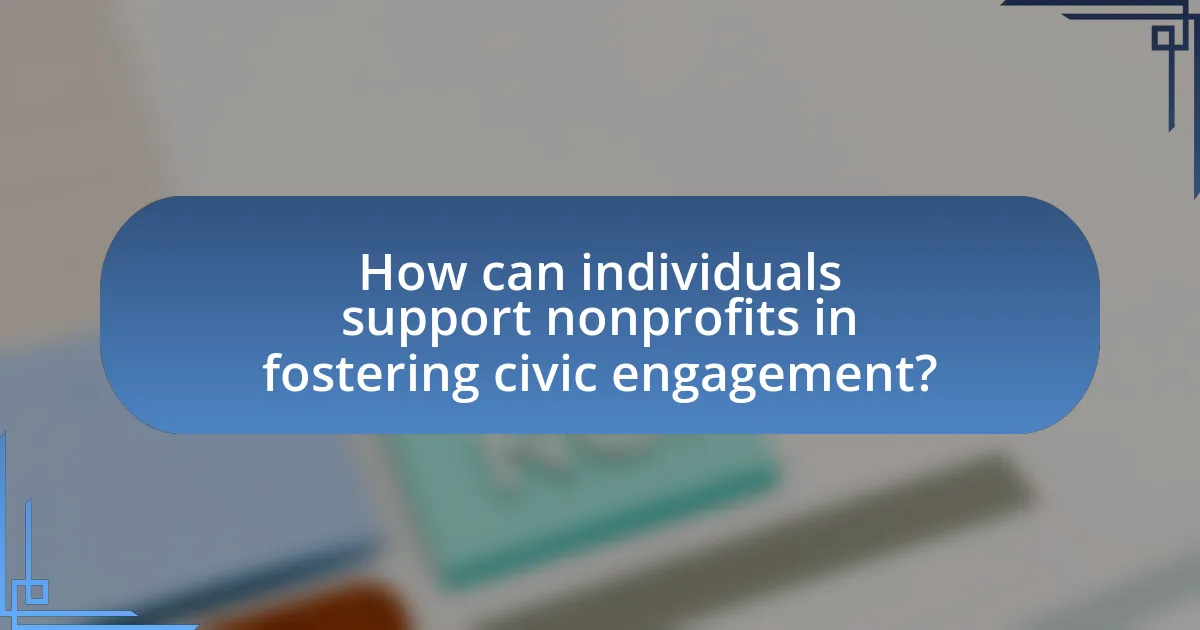
How can individuals support nonprofits in fostering civic engagement?
Individuals can support nonprofits in fostering civic engagement by volunteering their time and skills to assist in community outreach and educational programs. By actively participating in these initiatives, individuals help nonprofits raise awareness about civic issues and encourage community involvement. Research shows that volunteer engagement can increase civic participation rates; for example, a study by the Corporation for National and Community Service found that volunteers are more likely to vote and engage in community activities. Therefore, individual contributions of time and expertise directly enhance the capacity of nonprofits to promote civic engagement effectively.
What are effective ways for individuals to get involved with nonprofits?
Individuals can effectively get involved with nonprofits by volunteering their time, donating resources, or participating in fundraising events. Volunteering allows individuals to contribute skills and labor directly to nonprofit initiatives, which can significantly enhance the organization’s capacity to serve its mission. According to the Corporation for National and Community Service, in 2018, approximately 77 million Americans volunteered, contributing over 6.9 billion hours of service valued at $167 billion. Donating resources, whether financial or in-kind, provides nonprofits with essential support to sustain their operations and expand their programs. Additionally, participating in fundraising events not only raises necessary funds but also helps to raise awareness about the nonprofit’s cause, engaging the community further. These methods create a symbiotic relationship between individuals and nonprofits, fostering civic engagement and community development.
How can volunteering enhance personal civic engagement?
Volunteering enhances personal civic engagement by fostering a sense of community responsibility and encouraging active participation in societal issues. When individuals volunteer, they develop a deeper understanding of local challenges and the needs of their communities, which motivates them to engage in civic activities such as voting, advocacy, and public discussions. Research from the Corporation for National and Community Service indicates that volunteers are more likely to report higher levels of civic engagement, including increased voting rates and participation in community organizations. This correlation demonstrates that volunteering not only benefits the community but also empowers individuals to take an active role in shaping their civic environment.
What are the benefits of donating to nonprofits focused on civic engagement?
Donating to nonprofits focused on civic engagement enhances community participation and strengthens democratic processes. These organizations mobilize citizens to engage in local governance, advocate for policy changes, and promote voter education, which leads to increased civic awareness and involvement. Research indicates that communities with higher civic engagement experience improved social cohesion and better public services, as evidenced by a study from the National Civic League, which found that engaged communities are more likely to have effective local governance and higher levels of trust in public institutions. Thus, contributions to these nonprofits not only support their initiatives but also foster a more active and informed citizenry.
What resources are available for nonprofits to improve their civic engagement strategies?
Nonprofits can access various resources to enhance their civic engagement strategies, including toolkits, training programs, and funding opportunities. Organizations like the National Council of Nonprofits provide comprehensive toolkits that offer best practices and guidelines for effective civic engagement. Additionally, the Center for Nonprofit Advancement offers training programs focused on advocacy and community organizing, which are crucial for building civic engagement. Funding opportunities from foundations such as the Ford Foundation support initiatives aimed at increasing civic participation. These resources collectively empower nonprofits to develop and implement effective civic engagement strategies, thereby fostering greater community involvement and advocacy.
How can nonprofits build partnerships with local governments to enhance civic engagement?
Nonprofits can build partnerships with local governments to enhance civic engagement by aligning their missions with governmental objectives and actively participating in community planning processes. By collaborating on initiatives that address local needs, such as public health, education, or housing, nonprofits can leverage government resources and expertise while increasing their visibility and influence in the community. For instance, the National Council of Nonprofits highlights successful partnerships where nonprofits have co-hosted town hall meetings with local officials, fostering dialogue and encouraging citizen participation. This collaborative approach not only amplifies civic engagement but also strengthens the capacity of both nonprofits and local governments to serve their communities effectively.
